Mathis James Reed
b. September 6th, 1925 in Dunleith (Mississippi)
d. August 29th, 1976 in Oakland (California)
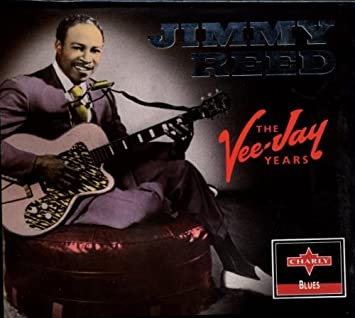
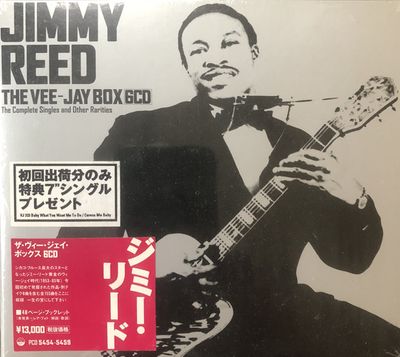
THE VEE-JAY YEARS
Charly
THE VEE-JAY BOX
P-Vine
June 1953 - 1965
Il apprend l'harmonica et la guitare en compagnie de son ami d'enfance Eddie Taylor. Ensemble, ils jouent lors de fêtes locales et dans les juke-joints de la région. Jimmy arrive à Chicago en 1943 et sert pendant deux ans dans la U.S. Navy (il participe à la seconde guerre mondiale). A son retour, Jimmy se marie avec Mary Lee "Mama" Reed et s'installe à Gary (Indiana). Il tente de percer sur la scène Blues de Gary et de Chicago jouant aux côtés de John Brim, Willie Joe Duncan, "Big Daddy" Kinsey. Après une audition sans lendemain chez Chess, Jimmy Reed signe chez Vee-Jay, l'autre grand label de Blues de Chicago. Avec son ami Eddie Taylor comme second guitariste, il démarre une fructueuse collaboration qui débouchera sur plusieurs grands succès publics. Ces deux coffrets rassemblent toute sa production pour le label chicagoan (détaillée ci-dessous) avec de nombreuses prises alternatives et titres inédits. Ses blues rythmiques et lancinants eurent une influence décisive sur de nombreux groupes de Rock anglais comme les Rolling Stones, Yardbirds, Animals, Bluesbreakers. Après une dizaine années de succès et de réussites, Jimmy Reed sombre doucement : son alcoolisme, ses crises d'épilepsie et son comportement de plus en plus imprévisible finissent par détruire peu à peu sa carrière.
He learned harmonica and guitar with his childhood friend Eddie Taylor. Together, they play at local parties and in the region's juke joints. Jimmy arrived in Chicago in 1943 and served for two years in the U.S. Navy (he participated in World War II). Upon his return, Jimmy marries Mary Lee "Mama" Reed and settles in in Gary, Indiana. He's trying to break into the Gary and Chicago Blues scene playing alongside John Brim, Willie Joe Duncan, "Big Daddy" Kinsey. After a short-lived hearing at Chess, Jimmy Reed signs with Vee-Jay, the other big label of Blues of Chicago. With his friend Eddie Taylor as second guitarist, he starts a fruitful collaboration which will lead to several great public successes. These two box-sets bring together all his production for the chicagoan label (detailed below) with many alternative takes and unreleased tracks. His rhythmic and haunting blues had a decisive influence on many english rock bands such as the Rolling Stones, Yardbirds, Animals, Bluesbreakers. After ten years of success, Jimmy Reed slowly sinks : his alcoholism, his epileptic strokes and his increasingly unpredictable behavior gradually destroy his career.
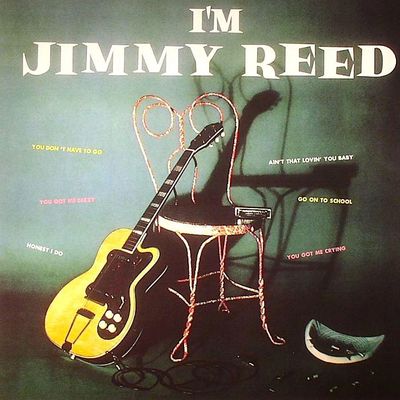
I'M JIMMY REED
Vee-Jay
Charly
Collectables
P-Vine
June 1953 - March 1958
Ce premier LP rassemble des titres gravés pendant la première partie de sa carrière chez Vee-Jay entre 1953 et 1958. Accompagné essentiellement d'Eddie Taylor et Earl Phillips (John Brim et John Littlejohn au tout début), il met au point ce blues-boogie hypnotique, simple mais excitant. Une musique brute et terrienne, vraiment entrainante et parfois répétitive. Cette première période est remplie de superbes moments dont certains sont composés par sa femme Mary Lee "Mama" Reed : "My first plea", "Boogie in the dark", "You got me dizzy", "Little rain", "You don't have to go" (un standard du blues qui sera fréquemment repris). Sur les rééditions CD, on peut trouver quatre morceaux additionnels dont les excellents "High and lonesome" et "She don't want me no more".
This first LP brings together tracks recorded during the first part of his career with Vee-Jay between 1953 and 1958. Accompanied mainly by Eddie Taylor and Earl Phillips (John Brim and John Littlejohn at the very start), he defines this hypnotic, simple but exciting blues-boogie. Raw and down-home music, really catchy and sometimes repetitive. This first period is filled with superb moments, some of which are composed by his wife Mary Lee "Mama" Reed : "My first plea", "Boogie in the dark", "You got me dizzy", "Little rain", "You don't have to go" (a blues standard which will be covered frequently). On the CD reissues, we can find four additional tracks including the excellent "High and lonesome" and "She don't want me no more".
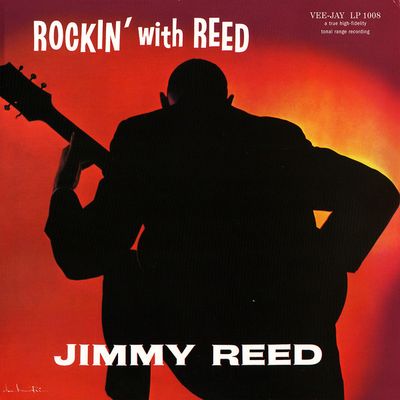
ROCKIN' WITH REED
Vee-Jay
Charly
Collectables
December 1953 / April 1957 - March 1959
Second LP publié par Vee-Jay encore très consistant avec de remarquables blues simples et excitants comme "Going to New York", "Ends and odds", "Caress me baby" (où Jimmy Reed montre qu'il est un harmoniciste plein de sensibilité), "Take out some insurance", "Down in Virginia", "Rockin' with Reed" (avec Eddie Taylor et John Littlejohn aux guitares et Albert King derrière la batterie). Derrière Jimmy Reed, un combo irrésistible avec Eddie Taylor, William "Lefty" Bates et l'irremplaçable batteur Earl Phillips. Sur les rééditions CD, on peut trouver quatre morceaux supplémentaires dont "I don't go for that".
Second LP released by Vee-Jay still very consistent with remarkable simple and exciting blues like "Going to New York", "Ends and odds", "Caress me baby" (where Jimmy Reed shows he is a sensitive harmonica player), "Take out some insurance", "Down in Virginia", "Rockin' with Reed" (with Eddie Taylor and John Littlejohn on guitars and Albert King behind the drums). Behind Jimmy Reed, an irresistible combo with Eddie Taylor, William "Lefty" Bates and the irreplaceable drummer Earl Phillips. On CD reissues, we can find four additional songs including "I don't go for that".
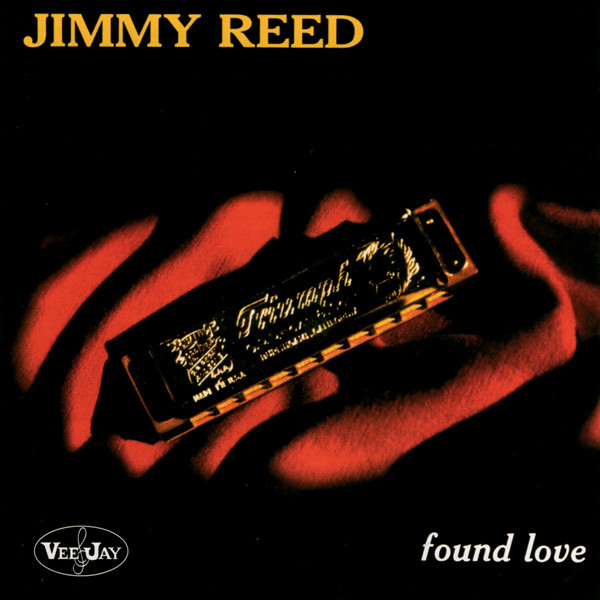
FOUND LOVE
Vee-Jay
Charly
Collectables
July 1955 / March 1959 - March 1960
On trouve dans ce nouveau recueil quelques beaux morceaux au rythme lancinant et hypnotique qui figurent parmi ses meilleurs réussites : "Baby what you want me to do", "Found love", "I was so wrong", "Big boss man", "I'm nervous" ou encore la reprise "I ain't got you". Derrière Reed, il y a toujours Eddie Taylor, "Lefty" Bates, Earl Phillips mais aussi Phil Upchurch et même Willie Dixon. Sur les rééditions CD, on trouve comme d'habitude quatre morceaux supplémentaires dont l'irrésistible "I'm gonna ruin you baby".
We find in this new collection some beautiful pieces with a haunting and hypnotic rhythm which are among his best achievements : "Baby what you want me to do", "Found love", "I was so wrong", "Big boss man", "I'm nervous" or even the cover "I ain't got you". Behind Reed is still Eddie Taylor, "Lefty" Bates, Earl Phillips but also Phil Upchurch and even Willie Dixon. On the CD reissues, there are as usual four additional tracks including the irresistible "I'm gonna ruin you baby".
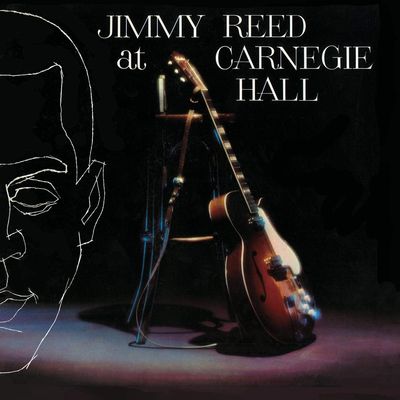
JIMMY REED AT CARNEGIE HALL
Vee-Jay
Charly
Collectables
August 1959 - 1961
Contrairement à ce que le titre peut laisser penser, il ne s'agit pas d'un album live. De plus, les séances qui constituent ce disque semblent toutes avoir été capturées à Chicago (et non à New York). Ceci dit, la musique enregistrée ici reste de tout premier plan. La production est parfaite et restitue merveilleusement ses blues trainants, paresseux et très efficaces : "Brights lights big city", "I'm Mr Luck", "What's wrong baby", "Kind of lonesome" ou l'instrumental "Blue Carnegie".
Contrary to what the title may suggest, this is not a live album. In addition, the sessions that make up this record all seem to have been captured in Chicago (not New York). That said, the music recorded here remains top notch. The production is perfect and wonderfully reproduces his dragging, lazy and very effective blues: "Brights lights big city", "I'm Mr Luck", "What's wrong baby", "Kind of lonesome" or the instrumental "Blue Carnegie".
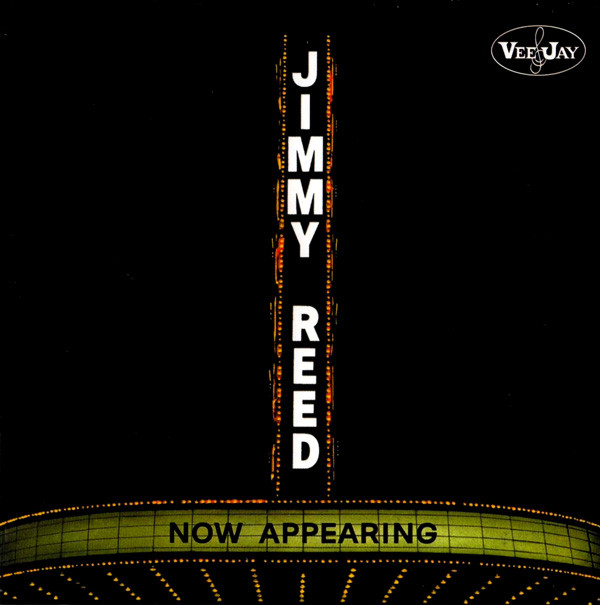
NOW APPEARING
Vee-Jay
Collectables
June - December 1960
Ce recueil rassemble des titres globalement moins intenses que sur les précédentes productions Vee-Jay. Un opus plutôt mineur en dépit d'une poignée de titres intéressants comme "Close together", "Laughing at the blues" ou "Ain't gonna cry no more".
This collection brings together titles that are generally less intense than on previous Vee-Jay productions. A rather minor opus despite a handful of interesting titles like "Close together", "Laughing at the blues" or "Ain't gonna cry no more".
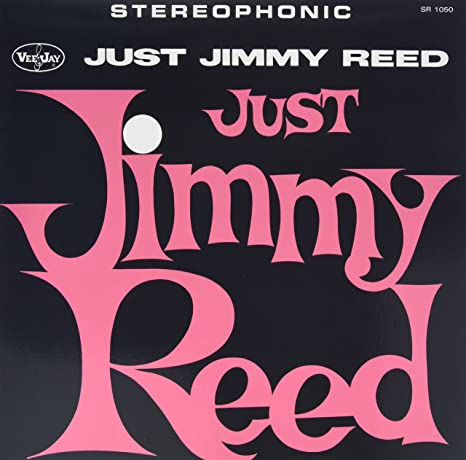
JUST JIMMY REED
Vee-Jay
Collectables
P-Vine
1962
Issu de séances datant de 1962, ce LP montre un Jimmy Reed en perte d'inspiration, progressivement dévoré par son alcoolisme (ce qu'illustrent certaines discussions dans le studio qu'on peut entendre ca et là dans le programme). On peut retenir néanmoins des morceaux comme "Let's get together" ou "Take it slow".
Resulting from sessions dating from 1962, this LP shows a Jimmy Reed in loss of inspiration, progressively consumed by his alcoholism (which is illustrated by certain discussions in the studio that you can hear here and there in the program). We can nevertheless retain songs like "Let's get together" or "Take it slow".
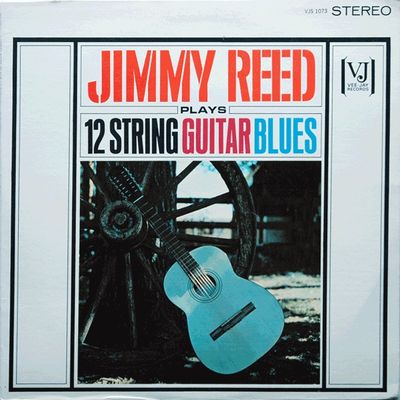
PLAYS 12 STRING GUITAR
Vee-Jay
Collectables
1963
D'après la Blues Discography, ce disque rassemble des morceaux déjà enregistrés précédemment et sur lesquels on a remplacé la voix de Jimmy par sa guitare 12 cordes. On trouve néanmoins deux titres inédits : "Blues for twelve strings" et "New Chicago blues".
According to the Blues Discography, this album brings together pieces already recorded previously and on which Jimmy's voice has been replaced by his 12-string guitar. There are, however, two unreleased tracks : "Blues for twelve strings" and "New Chicago blues".
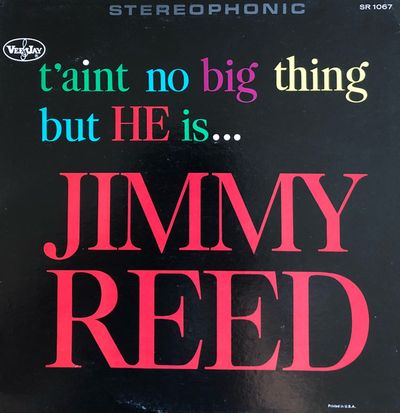
T'AIN'T NO BIG THING BUT HE IS JIMMY REED
Vee-Jay
Collectables
P-Vine
1963
La fin de sa carrière chez Vee-Jay apparait moins percutante que les premières années bien plus consistantes. Ici à l'instar de "Just Jimmy Reed", le programme est correct mais manque singulièrement de relief.
The end of his career at Vee-Jay appears less impactful than the much more consistent first years. Here like "Just Jimmy Reed", the program is decent but remains singularly flat at moments.
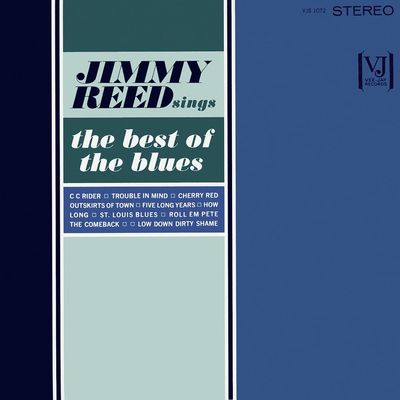
SINGS THE BEST OF THE BLUES
Vee-Jay
Collectables
1963
Il s'agit d'un album composé - comme le titre l'indique - de reprises de standards de blues. Mais Jimmy n'apporte pas grand chose à ces morceaux qu'il interprète dans une unité de tempo assez monotone.
It is an album composed - as the title indicates - of blues standards covers. But Jimmy does not bring much to these pieces which he interprets in a fairly monotonous unit of tempo.
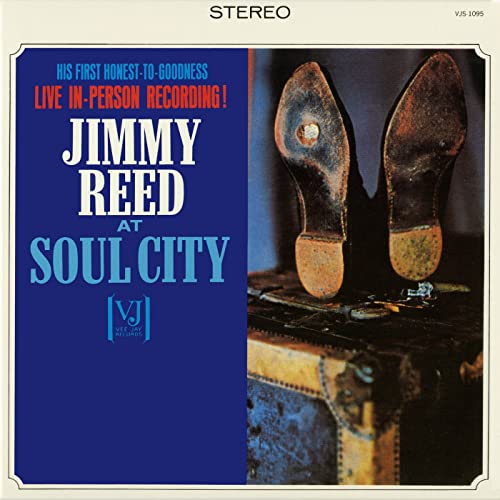
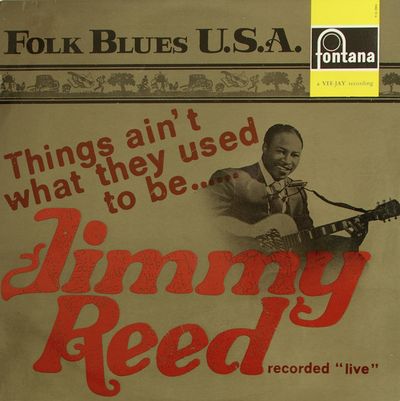
JIMMY REED AT SOUL CITY
Vee-Jay
Collectables
THINGS AIN'T WHAT THEY USED TO BE
Fontana
1964
Dernier album pour Vee-Jay (produit par Calvin Carter) après un peu plus de dix ans de collaboration. Plutôt inégal malgré quelques moments sympathiques : "Help yourself", "Left handed woman", "Fifteen years", "Devil's shoestring".
Last album for Vee-Jay (produced by Calvin Carter) after a little over ten years of collaboration. Rather uneven despite some nice moments : "Help yourself", "Left handed woman", "Fifteen years", "Devil's shoestring".
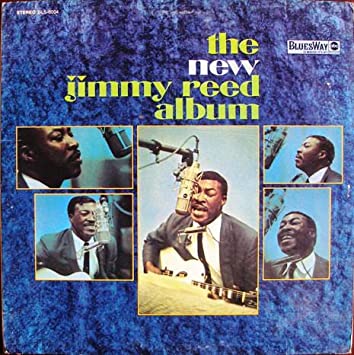
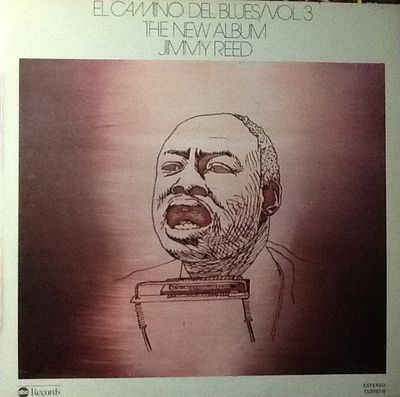
THE NEW JIMMY REED ALBUM
Bluesway
EL CAMINO DEL BLUES vol.3
ABC
November 1966
Quand Vee-Jay fait faillite en 1965, Jimmy Reed se retrouve sans label. Heureusement, son manager Al Smith le prend sous son aile et le conduit chez Bluesway pour une seconde carrière bien plus inégale. Grâce au travail de producteur-manager d'Al Smith et aux musiciens, le programme apparait beaucoup plus varié qu'à l'habitude. On retient "Big boss man", "Two ways to skin a cat", "Tell me what you want me to do", "Don't play me cheap", "I'm just trying to cop a plea". Derrière Reed - plutôt en forme - on trouve "Lefty" Bates, Jimmy Reed Jr, Jimmy Gresham et Al Duncan.
When Vee-Jay went bankrupt in 1965, Jimmy Reed found himself without a label. Fortunately, his manager Al Smith takes him under his wing and drives him to Bluesway for a second much more uneven career. Thanks to the work of producer-manager of Al Smith and the musicians, the program appears much more varied than usual. We retain "Big boss man", "Two ways to skin a cat", "Tell me what you want me to do", "Don't play me cheap", "I'm just trying to cop a plea". Behind Reed - rather in good shape - we find "Lefty" Bates, Jimmy Reed Jr, Jimmy Gresham and Al Duncan.
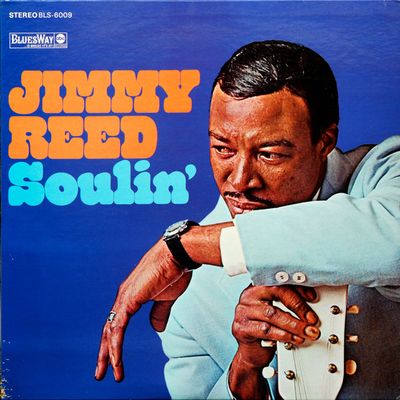
SOULIN'
Bluesway
May 1966 / April - May 1967
Ce second album pour Bluesway avec le producteur Al Smith est constitué de trois séances. Il y a d'abord quatre morceaux gravés initialement pour le label Exodus en mai 1966 (sa dernière séance avec son ami Eddie Taylor) puis deux séances en avril et mai 1967. Un programme nécessairement inégal mais d'où émergent une poignée de titres valant l'écoute : "Buy me an hound dog", "Feel like I want to ramble", "Don't press your luck woman", "I'm knockin' at your door".
This second album for Bluesway with producer Al Smith consists of three sessions. There are first four tracks engraved initially for the Exodus label in may 1966 (his last session with his friend Eddie Taylor) then two sessions in april and may 1967. A program necessarily uneven but from which emerge a handful of titles worth listening : "Buy me an hound dog", "Feel like I want to ramble", "Don't press your luck woman", "I'm knockin' at your door".
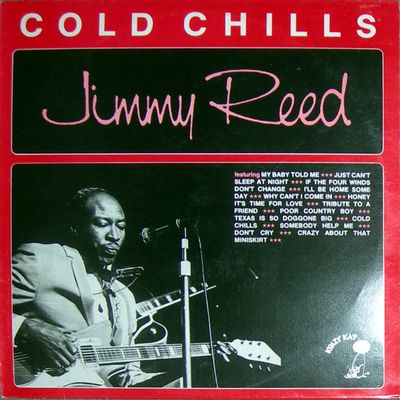
COLD CHILLS
Krazy Kat
April 1967
Dans cette compilation de faces Bluesway, on trouve un morceau inédit : le médiocre "If the four winds don't change".
In this compilation of Bluesway sides, we find an unreleased track : the mediocre "If the four winds don't change".
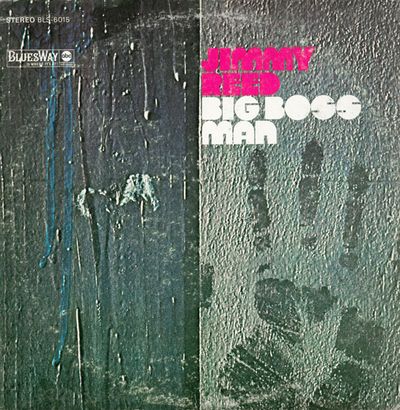
BIG BOSS MAN
Bluesway
November - December 1967
Jimmy Reed a perdu une partie de ses qualités de chanteur et d'harmoniciste. Malgré la présence d'excellents musiciens comme Wayne Bennett et Phil Upchurch (et même le retour d'Eddie Taylor), rien ne retient vraiment l'attention dans ce programme sans surprise.
Jimmy Reed has lost some of his skills as a singer and harmonica player. Despite the presence of excellent musicians like Wayne Bennett and Phil Upchurch (and even the return of Eddie Taylor), nothing really retains attention in this program without surprises.
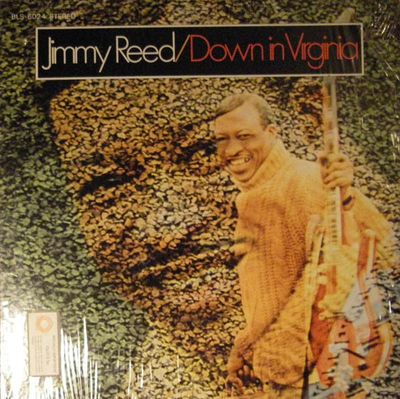
DOWN IN VIRGINIA
Bluesway
September - October 1968
Encore une fois ici, les parties d'harmonica s'avèrent très approximatives. L'inspiration n'est manifestement plus présente bien que le contenu ne soit pas indigne non plus.
Once again here, the harmonica parts turn out to be very approximative. The inspiration is clearly no longer present although the content is not unworthy no more.
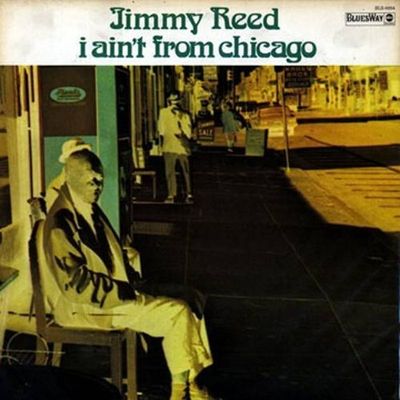
I AIN'T FROM CHICAGO
Bluesway
June 1969
Cet opus pour Bluesway reste aussi faible que les deux précédents. Jimmy a perdu beaucoup de ses capacités au chant et à l'harmonica et les musiciens qui l'accompagnent semblent également sans inspiration.
This opus for Bluesway remains as weak as the previous two. Jimmy has lost much of his abilities on vocals and on harmonica and the musicians that accompany him also seem uninspired.
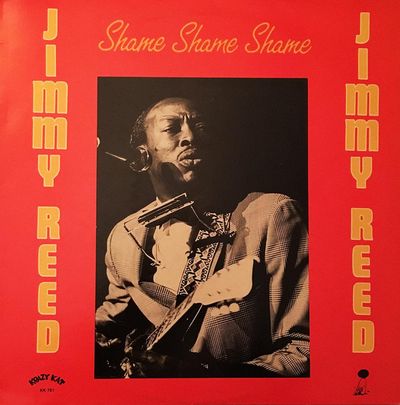
SHAME SHAME SHAME
Krazy Kat
1967, 1968 or 1969 ?
Un titre inédit "If you don't want me baby" probablement issu des dernières séances Bluesway.
An unreleased track "If you don't want me baby" probably from the last Bluesway sessions.
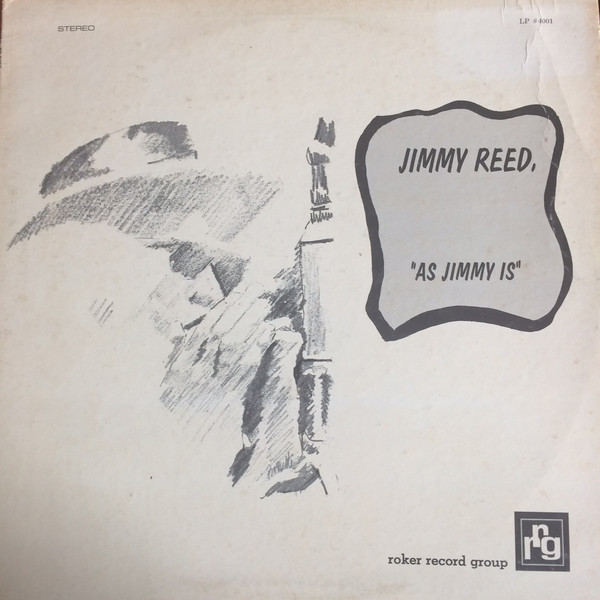
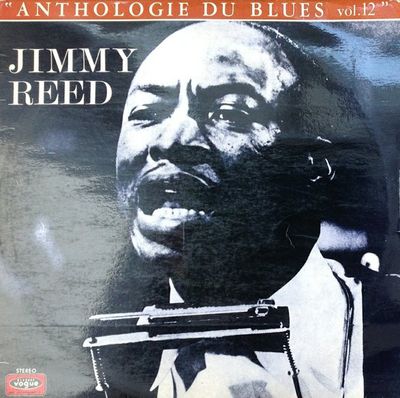
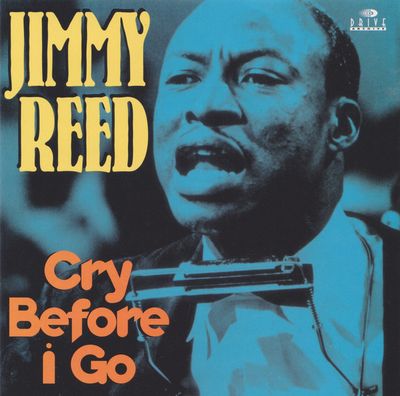
AS JIMMY IS
Roker
ANTHOLOGIE DU BLUES vol.12
Vogue
CRY BEFORE I GO
Drive
1969 - 1970
Après la période Bluesway, Jimmy enregistre un album pour le label Roker (dirigé par Lenny et Wally Roker). Pour celui-ci, il semble toujours être sous la supervision de son ami producteur Al Smith même s'il n'est pas crédité sur la pochette. Un ensemble désastreux : chant détaché, sans flamme, harmonica dissonant, sidemen en roue libre, mélodies répétitives.
After the Bluesway period, Jimmy recorded an album for the Roker label (directed by Lenny and Wally Roker). For this one, he always seems to be under supervision of his producer and friend Al Smith even though he is not credited on the cover art. A disastrous ensemble : detached and flameless singing, dissonant harmonica, sidemen with no direction, repetitive melodies.
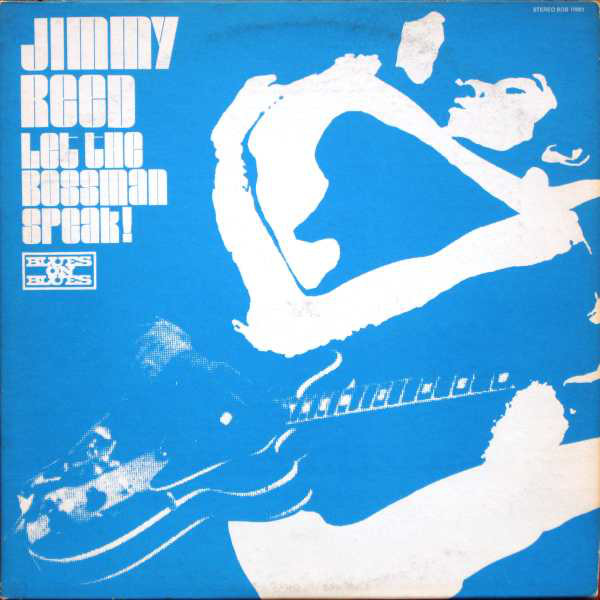
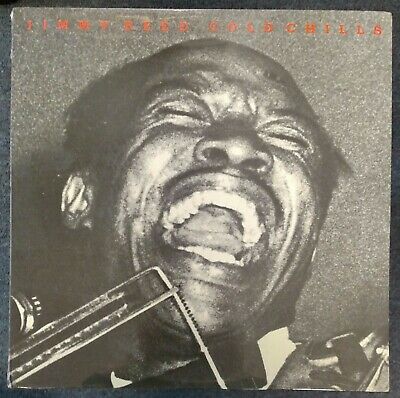
LET THE BOSSMAN SPEAK
Blues on Blues
COLD CHILLS
Antilles
1971
Après la période Bluesway, le producteur Al Smith crée un nouveau label Blues on Blues et propose à Jimmy Reed d'enregistrer le premier album de la marque nouvellement créée. Le disque est constitué de deux séances distinctes : la première avec Louis & Dave Myers (ou plutôt Jimmy Reed Jr) et Fred Below, la seconde avec "Lefty" Bates, Nick Charles, Roy Hytower, Jimmy Reed Jr et William Warren. Mais l'album reste bien médiocre malgré quelques moments intéressants de temps à autres. A conseiller aux fans confirmés.
After the Bluesway period, producer Al Smith creates a new label Blues on Blues and offers Jimmy Reed to record the first album of the imprint newly created. The album consists of two distinct sessions : the first with Louis & Dave Myers (or rather Jimmy Reed Jr) and Fred Below, the second with "Lefty" Bates, Nick Charles, Roy Hytower, Jimmy Reed Jr and William Warren. But the album remains very mediocre despite some interesting moments from time to time. Recommended for confirmed fans.
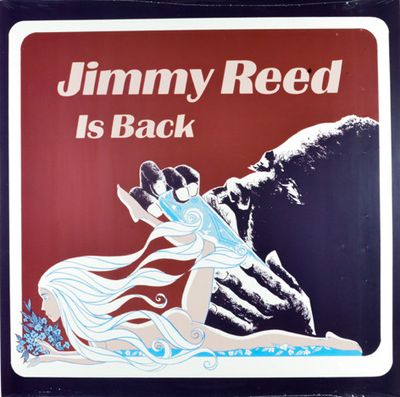
JIMMY REED IS BACK
Roots
Collectables
1971
Compilation éditée par Roots avec deux titres inédits provenant probablement des séances Blues on Blues.
Compilation issued by Roots with two unreleased tracks probably from Blues on Blues sessions.
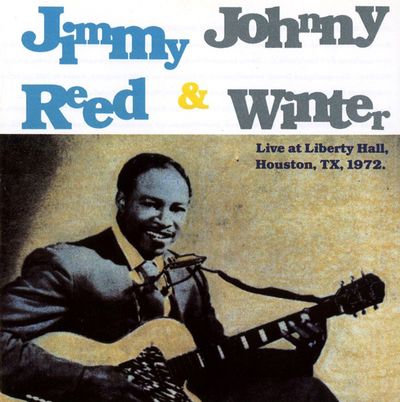
LIVE AT LIBERTY HALL
Last Call
Fan Club
July 1972
Dommage d'éditer un album aussi mauvais qui ne rend absolument justice à ces deux artistes. Qualité sonore médiocre, mixage inexistant, il n'y a rien d'intéressant ici. De plus, Jimmy - détruit depuis longtemps par son alcoolisme - n'est plus que l'ombre de lui-même.
Too bad to edit such a bad album which does absolutely not do justice to these two artists. Poor sound quality, no mixing, there is nothing interesting here. In addition, Jimmy - long destroyed by his alcoholism - is only a shadow of himself.
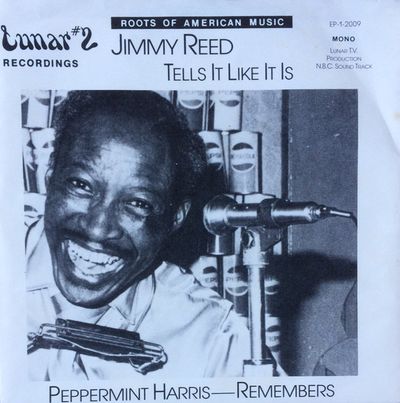
NBC TV SHOW (EP)
Lunar #2
December 1975
Voici d'obscurs enregistrements réalisés pour la chaine de télévision NBC. On entend Jimmy jouer deux morceaux (mal enregistrés et incomplets) et parler de sa carrière.
Here are some obscure recordings made for NBC television. We hear Jimmy play two songs (badly recorded and incomplete) and talk about his career.